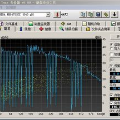Fog data processing systems provide key abstractions to manage data and event processing in the geo-distributed and heterogeneous fog environment. The lack of standardized benchmarks for such systems, however, hinders their development and deployment, as different approaches cannot be compared quantitatively. Existing cloud data benchmarks are inadequate for fog computing, as their focus on workload specification ignores the tight integration of application and infrastructure inherent in fog computing. In this paper, we outline an approach to a fog-native data processing benchmark that combines workload specifications with infrastructure specifications. This holistic approach allows researchers and engineers to quantify how a software approach performs for a given workload on given infrastructure. Further, by basing our benchmark in a realistic IoT sensor network scenario, we can combine paradigms such as low-latency event processing, machine learning inference, and offline data analytics, and analyze the performance impact of their interplay in a fog data processing system.
翻译:雾数据处理系统提供了管理地理分布和异构雾环境中数据和事件处理的关键抽象。然而,缺乏这种系统的标准基准测试妨碍了它们的开发和部署,因为无法量化比较不同的方法。现有的云数据基准测试对于雾计算来说是不适当的,因为它们关注工作负载规范,而忽略了雾计算中应用程序和基础设施之间的紧密集成。在本文中,我们概述了一种雾本地数据处理基准测试的方法,它将工作负载规范与基础设施规范相结合。这种整体方法允许研究人员和工程师量化给定基础设施上给定工作负载的软件方法的性能。此外,通过在一个现实的物联网传感器网络场景中建立基准测试,我们可以将低延迟事件处理、机器学习推断和离线数据分析等范式结合起来,并分析它们在雾数据处理系统中的相互作用对性能的影响。



